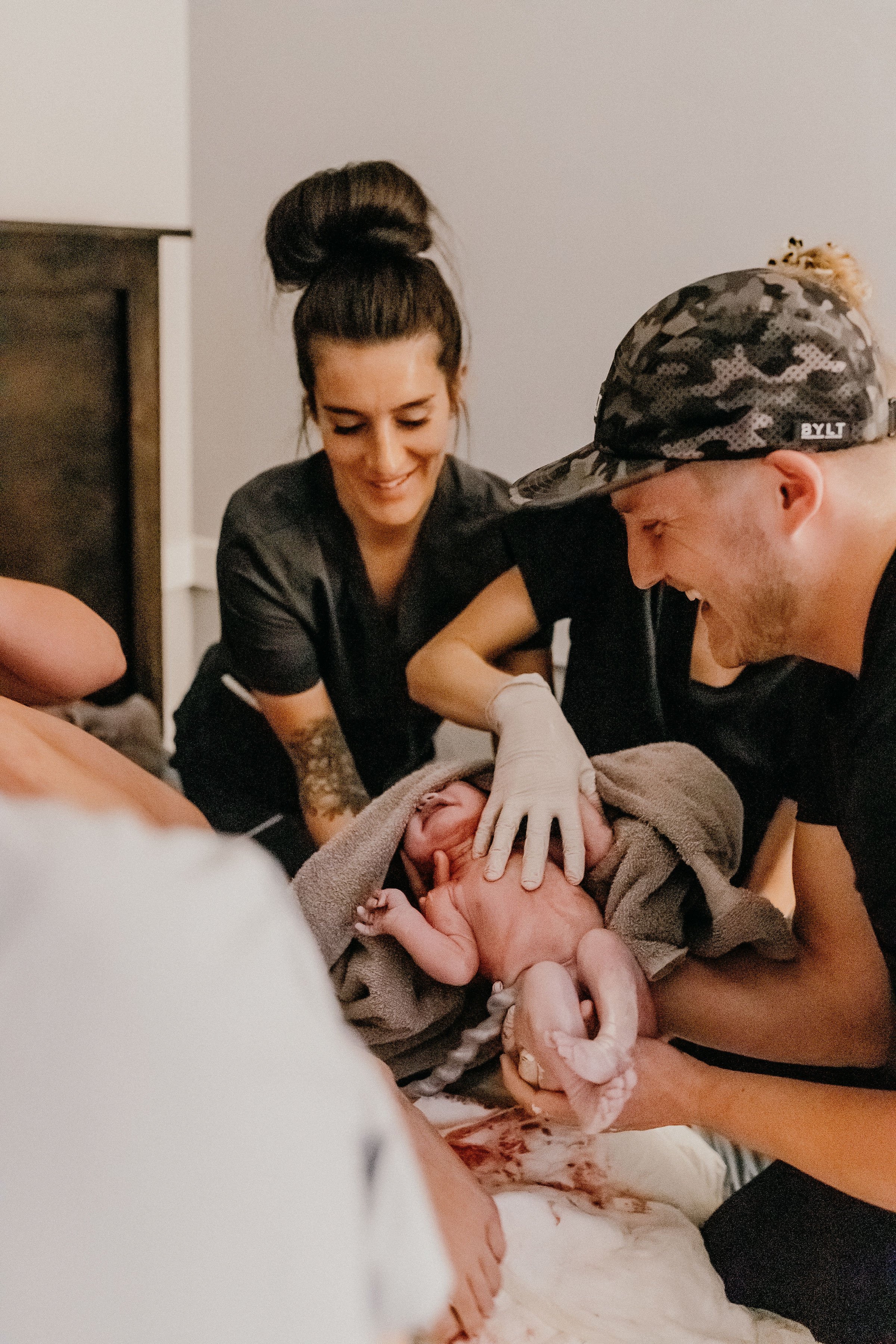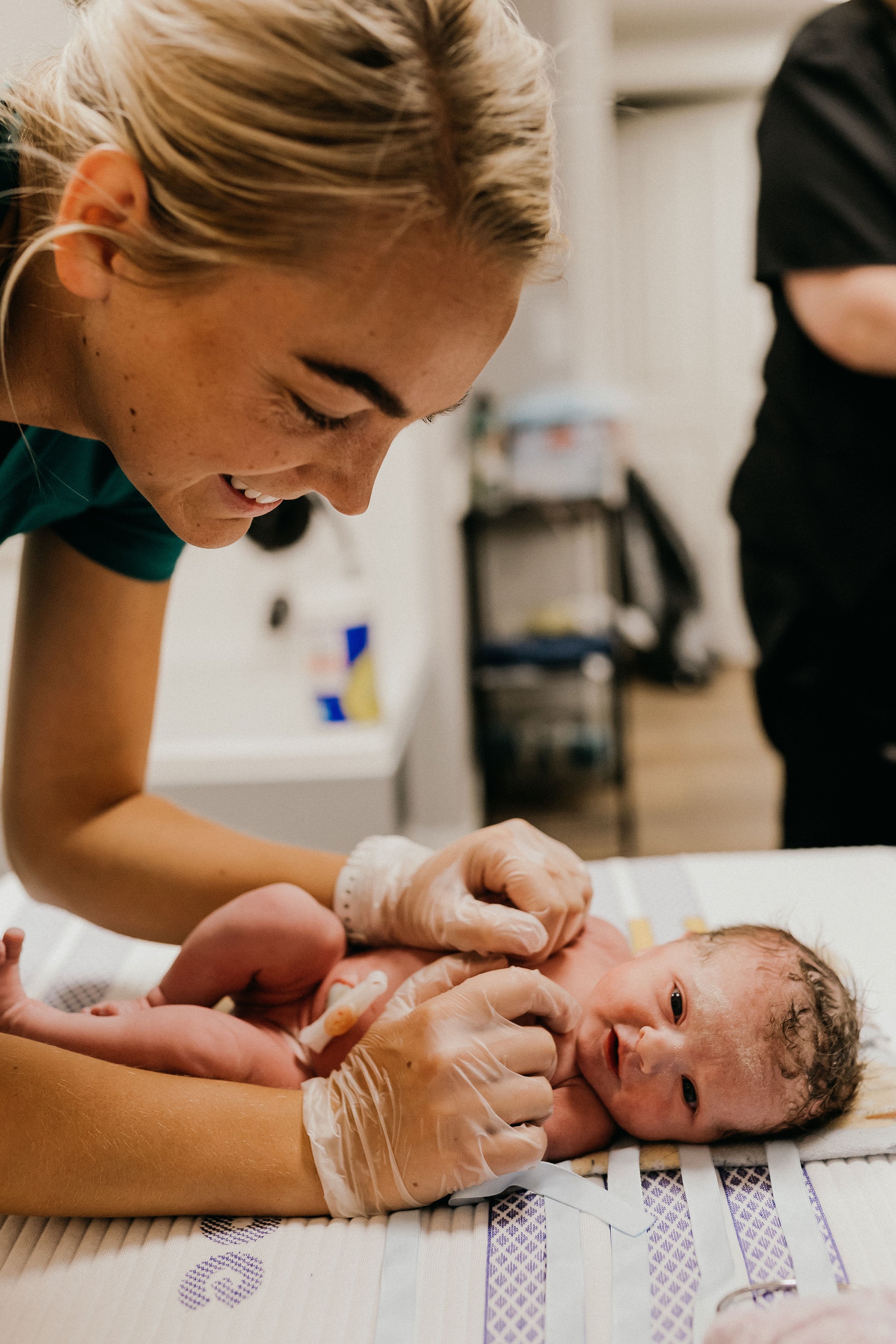
Midwifery Services
Midwives are known as “low-risk maternity care providers.” We work with women who are considered low risk and who are generally healthy.
We would love to be the care provider team for your pregnancy and birth.
Services at Utah Birth Suites include…
Initial Visit and Schedule of Subsequent Visits
We generally see new clients for the first time at +/- 12 weeks. At this initial visit, in addition to a standard prenatal check, we will go over your history (nutritional, physical, emotional, mental, etc.), collect blood for your OB panel workup (see the informational document on this in your client portal), and begin getting to know each other (and your support people).
After this initial appointment, we will schedule you for a prenatal visit every four weeks until you’re 28 weeks, and then every two weeks until you’re 36 weeks, at which time, you’ll be seen every week until you give birth. At around 36 weeks, we will have a home visit with you (unless you're giving birth at the birth center) where we will assess your home space, get an idea of where things are and otherwise assess safety, warmth, preparedness, etc.
We take into consideration that occasionally, there is a problem or concern that requires an extra visit or more, and those unexpected visits are also included in your care.
Prenatal Visits
A typical prenatal visit consists of using our hands to palpate your uterus through your abdomen, listening to baby’s heart rate, measuring your uterine growth, taking your vitals, and otherwise talking with you to get an idea of how you’re feeling, both emotionally and physically.
At some visits, you’ll also have additional procedures and lab work, depending on what week you are in. These visits (with the exception of the homebirth home visit) occur at the birth center.
Additional Procedures and Lab Work
Additional procedures and lab work follow this schedule:
At between 20 and 22 weeks, 20 weeks being ideal, you’ll have a routine OB scan ultrasound. An OB scan can give us much valuable information, such as where the placenta is attached. We work closely with a wonderful ultrasound tech to do all of our necessary sonograms. We can often make it to this visit with you, at your request.
At between 28 and 32 weeks, we do a gestational diabetes screen to make sure you are metabolizing glucose well. If the glucose screen number is outside of normal limits, we will do further glucose testing. We do this to make sure that you aren’t developing gestational diabetes, which can lead to unwanted complications. At the same time, we will also do a basic CBC (complete blood count). We do this to make sure that your hematocrit, hemoglobin, platelets and other things are at safe levels for birth.
At 36 or 37 weeks, we will test for GBS (group B strep). This is done by taking a swab of the inside of the vagina. We let our clients do this themselves, as we feel you are quite capable. For more information on all of these tests, please see your client portal.
If complications arise, which fall under our scope of practice to treat, we may additionally complete other testing such as a urine sample, liver panel, vaginal culture, etc. Anything we do will be discussed in depth with you and we will never complete a procedure (unless in an emergency) without your consent. You have the right to refuse any test you don't feel comfortable with.

Birth
At your birth, you can expect the following:
Fetal heart tones will be taken every half-hour in active labor, and every other contraction in the pushing phase. We take fetal heart tones with a doppler that has a small plastic probe on it that we hold to your belly. We will listen for up to two-minutes each time. This helps us ensure that your baby is tolerating labor well, helps us to confirm position of baby, and can also give us an idea of when your baby has moved deep into your birth canal.
We will take your vitals when we arrive and then every one to four hours throughout labor.
Cervical checks are only performed at your request and consent. The midwife may suggest one and you'll discuss it together, but the ultimate decision is yours. It may be useful in determining baby’s position or how labor is progressing. Sometimes we don’t do any at all, depending on the situation.
Labor support and encouragement go hand in hand with midwifery, but keep in mind that our first responsibility is to the health of you and your baby. Sometimes charting, conferring with another professional, assessing vitals, setting up birth supplies, etc. need to be attended to in order to keep you and your baby healthy. We strongly recommend inviting additional support people, such as a doula, to your birth for this reason.
We will watch over you while you birth your baby and answer any questions that arise. We may also, with your consent, use herbs, homeopathic remedies or medications in the event of additional needed support.

Immediate Postpartum
Immediately following birth, you can expect the following:
The assessment of immediate blood loss, and subsequent mechanical maneuvers and administration of anti-hemorrhagic drugs, if the loss is deemed a hemorrhage.
Gentle stimulation of the baby if it isn’t breathing right away and the employment of neonatal resuscitation protocols if baby needs further help.
We do not clamp and cut umbilical cords until you give your permission. This often happens about an hour after birth.
Assistance with birthing your placenta. Many women choose to guide their own placentas out but the midwives are happy to guide it out if you'd rather not.
About one hour after birth, unless you request it earlier, we will gently check you for any tearing. If you need a repair, we will discuss options for this such as leaving it alone, using super glue, or suturing with lidocaine.
Assessment of uterine firmness and height with gentle touch.
Assistance with breastfeeding at your request and assessment of latch.
Assessment of overall well-being of both mother and baby, taking vitals on each and giving an APGAR score to the baby at 1 minute, 5 minutes and sometimes 10 minutes post-birth.
The performance of a comprehensive newborn exam, including administration of eye ointment and vitamin K if you choose to have these things.
24 — 48 Hours Postpartum
At this visit, we come to you, since we want you to be resting and bonding with your baby. We will check vitals on both you and your baby, check on breastfeeding and latch, check your uterus for firmness and bleeding, weigh your baby, ask you about how your perineum is and check the area at your request, check your and your baby’s bowel and bladder function, and check on your emotional and mental health. We will also take the umbilical clamp off of your baby and check the umbilical cord at this time. We also perform part 1 of the Newborn Metabolic Screen, a congenital heart screen, and a hearing screen.
2, 4, and 6 Week Postpartum Visits
At these visits, we repeat all the things listed above, except for the cord clamp removal. At the two-week, we will do part 2 of the Newborn Metabolic Screen. Additionally, at the six-week visit, we will discuss birth control options and make sure that you are well on your way to healing completely from birth. These postpartum visits occur at the birth center.

Frequently Asked Questions
-
Here are some more things that set us apart from the typical OB office. Our visits are one hour long instead of the typical 3-to-6 minute visit at an OB office. Also, though we are occasionally behind schedule by 5 or 10 minutes, typically your visit starts at the time you scheduled it for. No waiting in a waiting room for 45 minutes!
We spend the hour checking on you clinically, but we also check on how you’re doing emotionally and mentally, and how you’re doing in your life in general because midwifery care isn’t just about the numbers, it’s about the whole person. Having a baby is a life event, not a medical procedure.
We also offer IVs for pregnancy and birth, postpartum medications in case of postpartum hemorrhage, oxygen, free doulas, waterbirth, uninterrupted golden hour time with baby, standard lab-work, ultrasounds, one-hour long prenatal visits, FOUR postpartum visits, early gender reveal DNA testing, sterile water technique for relieving the back pain of labor, ACOG standard fetal monitoring, and suturing with lidocaine.
-
We do not offer refunds for hospital transfer. About 10% of our clients transfer to a hospital, most of which choose to transfer in labor for an epidural. If we labor with you, there are no refunds, if we transfer you in pregnancy due to pregnancy complications that make a hospital birth the safest choice, we refund the labor and birth fee.
-
We don’t accept insurances but there is an health share called, “Christian Health Care Ministries” that has covered 100% or the cost for all of our clients who have them as their insurance providers. We also accept HSA and HMA payments. We do offer payment plans as long as the balance is paid in full by 36 weeks.
-
We are qualified and trained maternal health care providers who are recognized by the state of Utah and other national and international organizations. While doulas focus solely on emotional and physical support during labor and birth, midwives extend beyond that as medical providers who are trained to provide both holistic and medical care to healthy pregnant women. Midwives are less common in the United States (we’re working on that!), but they are the primary maternal health provider throughout the world in most cultures.
Midwifery Care Investment
Our price for these services is $6300*. This includes your 20-week ultrasound, all prenatal and postpartum visits, the birth, newborn screenings, and standard newborn care for the first six weeks. This fee also covers your Utah Birth Suites Team.
Lab work is billed to your insurance.
*Non-routine services that may be provided for an additional fee:
RhoGAM
Early ultrasounds
Third trimester ultrasounds
Non-routine labwork
IV fluids during pregnancy
Sneak Peak Early Gender Test
Late to care discount: If you come into care after 28 weeks, we will take $500 off your bill upon receiving records of prior prenatal care.
Are you ready to find out if the midwifery model of care is the right fit for your birth?
Schedule a free chat with one of our midwives to discuss what care might look like for you.
